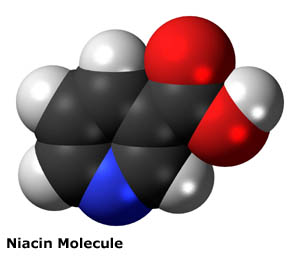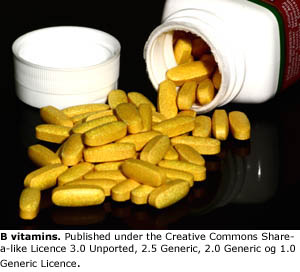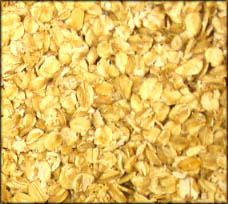How to Use Niacin for Cholesterol Lowering: Guidelines and Recommendations
Can I use Niacin to lower cholesterol?
This important question often arises when people are looking at ways of using niacin for cholesterol lowering purposes. But the answer is more complicated than you might imagine.
What Is Niacin?
Niacin Is a Complex B Vitamin
Put simply, niacin (also known as vitamin B3, nicotinic acid or vitamin PP) is one of the complex B vitamins used by your body. It plays an important role in the digestive process where it turns the carbohydrate from your food into energy.
Niacin also helps to keep your nervous system functioning healthily.
It is interesting to note that if you follow a healthy eating plan you will probably already be getting enough niacin from your diet in order for these bodily processes to function normally which means you won’t need to take any supplements of niacin for cholesterol lowering purposes.
 It is very rare for anyone in the west and developed countries to suffer from vitamin B3 deficiency – unless it is through alcohol abuse.
It is very rare for anyone in the west and developed countries to suffer from vitamin B3 deficiency – unless it is through alcohol abuse.
The B vitamins are water-soluble, which means they are carried around the body and then excreted out in your urine if they’ve not been used – the body can not store them. This is the reason why a healthy diet is the best source of maintaining a good vitamin B balance.
What Is Niacin Used for in the Body?
Niacin Is Essential for the Digestive and Nervous System
As well as being an important B vitamin which is essential for the healthy functioning of the digestive and nervous system, niacin is also an important vitamin when it comes to maintaining healthy hair, skin, eyes and the liver.
It is often called a B complex vitamin and it improves circulation, as well as helping the body to produce the sex and stress hormones which are made in the adrenal glands.
Niacin for Cholesterol: Why Is Niacin Being Talked about in Relation to Cholesterol Levels?
Niacin Helps the Production of the Good Cholesterol
What is exciting is that studies have suggested niacin may also help to raise levels of HDL (high-density lipoprotein) – aka “good” cholesterol. And by raising your HDL levels, your LDL “bad” cholesterol levels can be significantly reduced.
This is why research into niacin for cholesterol is a hot topic.
However, the Mayo Clinic points out that having a low HDL level is also a risk factor for developing heart disease, even if your LDL and other risk factors are also low. This means that low LDL levels should not be considered in isolation. The clinic recommends that your HDL levels should be above 60mg/l (milligrams per deciliter).
How Can You Use Niacin for Cholesterol Lowering Purposes?
 In order to use niacin as a way of raising your HDL levels the dosage must be high. High enough that it has to be issued under prescription by a medical practitioner.
In order to use niacin as a way of raising your HDL levels the dosage must be high. High enough that it has to be issued under prescription by a medical practitioner.
This is because if it is administered at too high a dose it can be toxic. Generally, your doctor will ensure that the dose is increased slowly over the course of a few weeks to avoid any irritation to the stomach.
It’s important to stress that it’s just not possible to get enough niacin from your diet alone to increase your HDL levels. But it is good to know there are proprietary products available to you if you are suffering from high cholesterol. You may have heard of prescription niacin products under the brand names Niaspan or Niacor.
Foods that Contain Sources of Vitamin B3
Your Recommended Daily Allowance of Niacin
The list is quite a long one and includes foods that you are probably eating on a regular basis anyway – which is why it is possible to get your recommended daily allowance (RDA) of niacin through your diet without the need to consider niacin for cholesterol lowering, (see below for a guide to the RDA of niacin).
Sources of Niacin
 – Red meat
– Red meat
– Liver
– Heart
– Kidney
– Chicken
– Turkey
– Salmon, swordfish, tuna, scallops.
 Dairy products
Dairy products
– Milk
– Eggs
– Cheese
 Nuts, seeds and cereals
Nuts, seeds and cereals
– Whole grains
– Sunflower seeds
– Peanuts
– Nuts
– Fortified cereals
– Wholewheat bread
 Vegetables and fruits
Vegetables and fruits
Broccoli, asparagus, beet vegetables, green leafy vegetables, mushrooms, sweet potatoes, tomatoes, legumes, dates, prunes
And also, don’t forget the vegetarian’s favorite – yeast extract!
Niacin RDA as specified by the National Institutes of Health, USA.
Age:
0-6 months 2mg
7-12 months 4mg
1-3 years 6mg
4-8 years 8mg
9-13 years 12mg
Boys and men 14 years and over 16mg
Girls and women 14 years and over 14mg.
Lack of Niacin Causes Risk of Pellagra
The most common disease associated with a lack of vitamin B3 is pellagra. It is common among people who’s diets consist mainly of corn as their staple food.
Pellagra causes dementia, diarrhea and dermatitis, but it can be cured with niacin supplements.
Side Effects of High Dose Niacin Use
The side-effects of taking a high dose niacin product include: flushed and/or burning skin, stomach upset, headaches, dizziness and blurred sight. It may also cause liver damage. These are the reasons why high doses of niacin should only be taken under medical supervision.
I Heard Taking Niacin for Cholesterol Was Dangerous – Didn’t They Stop a Drugs Trial?
You are thinking about the US study called AIM-HIGH, (Atherothrombosis Intervention in Metabolic Syndrome with Low HDL/High Triglyceride and Impact on Global Health Outcomes), which was sponsored by the National Heart, Lung and Blood Institute (NHLBI).
In this study the researchers were looking to see whether raising HDL with a drug based on niacin, while at the same time lowering LDL with a statin drug could prevent more instances of heart disease than by just taking the statin by itself.
This is an ongoing study that started in 2006 and was due to finish in 2012, but it was halted eighteen months early.
Why was the AIM-HIGH niacin for cholesterol trial halted early?
The trials were halted early because the researchers could see no significant reduction in the risk of cardiovascular events (heart attacks, strokes) between the control group taking statins only and the trial group taking both statins and niacin.
Although their final conclusions have yet to be released they state in their press release that:
“While lowering LDL decreases the risk of cardiovascular events, it has not been shown that raising HDL similarly reduces the risk of cardiovascular events.”
Those participants who had taken the combined high dose, slow release niacin and statin did have increased HDL cholesterol and lower triglyceride levels compared to the control group. But statistically the combined treatment did not show any significant reduction in fatal or non-fatal heart attacks – which was why the study was halted early.
Susan B. Shurin, MD, the acting head of the NHLBI, is quoted as saying:
“Seeking new and improved ways to manage cholesterol levels is vital in the battle against cardiovascular disease … Although we did not see the expected clinical benefit…”
She goes on to say that:
“Patients who were not in the AIM-HIGH trial should not stop taking high dose, extended-release niacin without talking to their doctor first.”
The researchers and doctors involved in the research seem to be disappointed by the results. Saying that it was “unexpected and a striking contrast to the results of previous trials and observational studies”.
So if the Jury Is Still out, Should You Continue to Include Niacin for Cholesterol in Your Diet?
Yes.
Niacin is an essential B vitamin. It supports a healthy nervous system, gastrointestinal functions and has many other vital functions within the body.
But unless you have been told by your medical practitioner to take a high dose vitamin B3 supplement, then you should be getting all you need from your own balanced healthy diet.
Researchers are not saying you should stop if you are under medical supervision. They are saying consult your own medical doctor for advice regarding the dosage and use of niacin for cholesterol.
If I Am not Taking Niacin for Cholesterol, What other Things Can I do to Help Raise my HDL Levels?
If you want to raise your HDL levels then it can be done safely through a combination of diet and exercise.
Aerobic Exercise
 By increasing your heart rate through regular aerobic exercise (walking, jogging, swimming, etc.) for 20-30 minutes at a time, at least four times a week, you can increase your levels of HDL.
By increasing your heart rate through regular aerobic exercise (walking, jogging, swimming, etc.) for 20-30 minutes at a time, at least four times a week, you can increase your levels of HDL.
Rather than the intensity of the exercise, recent research has revealed that it is the duration that matters.
So don’t overdo it, you don’t need to break the four minute mile! Keep your heart rate up within safe limits and take you time.
Give up Smoking
 If you smoke, stop. Giving up tobacco will result in an increase in your HDL levels.
If you smoke, stop. Giving up tobacco will result in an increase in your HDL levels.
Tackle Your Weight
If you are obese or overweight you will have increased LDL levels, and low HDL levels.
By losing weight you will increase your HDL.
Eat more Soluble Fiber and Omega-3 Fatty Acids
 Soluble fiber is the miracle ingredient when it comes to increasing your HDL.
Soluble fiber is the miracle ingredient when it comes to increasing your HDL.
Found in oats, legumes, vegetables and fruit – eat with impunity.
Cut out or at Least Reduce Your Trans-Fatty Acids and Soluble Fat Intake
Trans fatty acids are found in processed foods.
They increase your LDL and lower your HDL level.
Saturated fats are found in animal fats, cutting back on these will help lower your levels of LDL.
Niacin to Lower Cholesterol – What Does the Future Hold?
Without doubt more research is needed to make precise recommendations of niacin for cholesterol!
The correlation between niacin and higher levels of HDL is known, but the high dose required makes general usage difficult.
However, most studies conclude that niacin is an effective and inexpensive treatment that can improve the cholesterol-to-HDL ratio.
So at the moment, unless under medical supervision, high doses of niacin are not advised – just keep eating a healthy balanced diet, take some exercise and make a few lifestyle changes – the effects on your HDL levels will be just as good!
What Articles on Cholesterol Lowering Supplements Would You Like to Read Now
Fish Oil and Cholesterol: The Natural Benefits of Omega 3
List of Cholesterol Lowering Herbs and Other Natural Supplements for a Healthy Body
Natural Cholesterol Lowering Supplements for Reducing LDL Levels
Niacin and Other Cholesterol Lowering Supplements – Which Route Is for Me?
Red Yeast Rice and Cholesterol – Is It Both Effective and Safe?
The Pros and Cons of Cholesterol Meds: Taking Cholesterol Lowering Medications for Your Health
Go to the top of this article about Niacin for Cholesterol
Go to the homepage Cholesterol Lowering Foods
